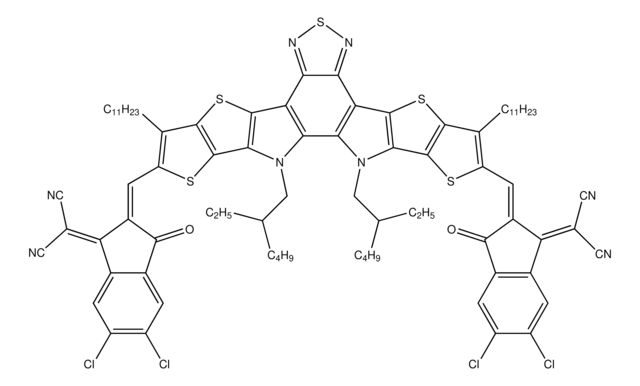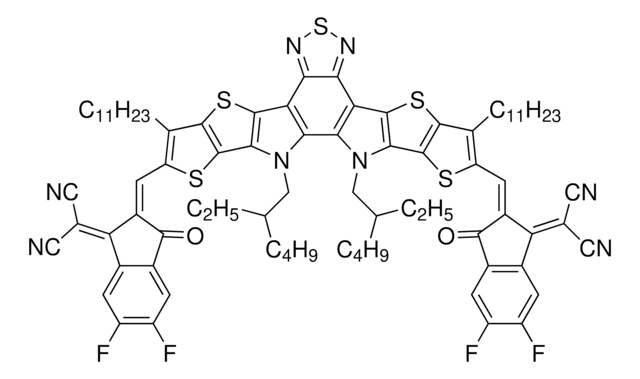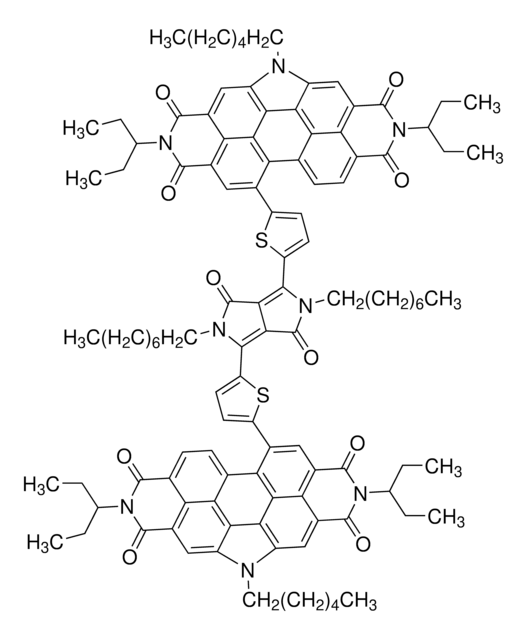908509
Y6
Synonym(s):
BTP-4F, Non fullerene acceptor Y6, PCE 157
Sign Into View Organizational & Contract Pricing
All Photos(2)
About This Item
Empirical Formula (Hill Notation):
C82H86F4N8O2S5
CAS Number:
Molecular Weight:
1451.93
UNSPSC Code:
32111701
NACRES:
NA.23
Recommended Products
description
Band gap: 1.55 eV
Assay
≥99%
form
solid
solubility
chloroform: soluble
Orbital energy
HOMO -5.65 eV
LUMO -4.10 eV
Looking for similar products? Visit Product Comparison Guide
General description
Non-fullerene acceptors (NFAs) are currently a major focus of research in the development of bulk-heterojunction organic solar cells (OSCs). In contrast to the widely used fullerene acceptors (FAs), the optical properties and electronic energy levels of NFAs can be designed and readily tuned. NFA-based OSCs can also achieve greater thermal stability and photochemical stability, as well as longer device lifetimes, than their FA-based counterparts.Recent developments have led to a rapid increase in power conversion efficiencies for NFA OSCs, with values now exceeding 15% in a single junction cell, and >17% for a tandem cell, demonstrating the viability of using NFAs to replace FAs in next-generation high-performance OSCs.
Y6 is a non-fullerene acceptor-donor-acceptor (A-D-A) type small molecular acceptor (SMA) with flexible alkyl chains and a centrally fused ring. It has a ladder-type electron-deficient core, which can be blended with PM6 for organic photovoltaic applications.
Application
Y6 is a non-fullerene acceptor (NFA) that uses an electron-deficient molecular core to obtain a low bandgap with improved electron affinity. OPV devices made from Y6 can reach exceptionally high performances in single-junction devices, with a maximum PCE reported of 15.7% (14.9% certified by Enli Tech Laboratory) when paired with PM6. Y6 is versatile and can be employed in both conventional and inverted OPV device architectures and can maintain a high PCE with varying active layer thicknesses (13.6% in thick 300 nm layers).
Y6 is used as an electron acceptor material in organic solar cells. It has shown promising results in improving the power conversion efficiency of organic solar cells. Y6 and its derivatives are also used in material engineering studies to understand the relationships between molecular structure, morphology and device performance in organic photovoltaics.
Storage Class Code
11 - Combustible Solids
WGK
WGK 3
Flash Point(F)
Not applicable
Flash Point(C)
Not applicable
Certificates of Analysis (COA)
Search for Certificates of Analysis (COA) by entering the products Lot/Batch Number. Lot and Batch Numbers can be found on a product’s label following the words ‘Lot’ or ‘Batch’.
Already Own This Product?
Find documentation for the products that you have recently purchased in the Document Library.
Customers Also Viewed
Single-Junction Organic Solar Cell with over 15% Efficiency Using Fused-Ring Acceptor with Electron-Deficient Core
Yuan J, et al.
Joule, 3(4), 1140-1151 (2019)
Fine-Tuning Energy Levels via Asymmetric End Groups Enables Polymer Solar Cells with Efficiencies over 17\%
Luo Z, et al.
Joule, 31(39), 1903441-1903441 (2020)
Eco-compatible solvent-processed organic photovoltaic cells with over 16% efficiency
Hong L, et al.
Advanced Materials, 31(39), 1903441-1903441 (2019)
PTPsigma inhibitors promote hematopoietic stem cell regeneration
Zhang Y, et al.
Nature Communications, 10(1), 1-15 (2019)
Our team of scientists has experience in all areas of research including Life Science, Material Science, Chemical Synthesis, Chromatography, Analytical and many others.
Contact Technical Service





![[6,6]-Phenyl C61 butyric acid methyl ester >99.5%](/deepweb/assets/sigmaaldrich/product/structures/359/221/d990c746-0960-4c69-bf76-fe09b193824d/640/d990c746-0960-4c69-bf76-fe09b193824d.png)
![2,5-Dihydro-3,6-di-2-thienyl-pyrrolo[3,4-c]pyrrole-1,4-dione 97%](/deepweb/assets/sigmaaldrich/product/structures/209/681/63a4048f-a2a7-496b-814d-ccb4b5b76124/640/63a4048f-a2a7-496b-814d-ccb4b5b76124.png)

